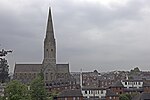Exeter TMD
Buildings and structures in ExeterRail transport in DevonRailway depots in EnglandUse British English from December 2016

Exeter Traction Maintenance Depot (or Exeter TMD) is a railway Traction Maintenance Depot situated in Exeter, Devon, United Kingdom and is next to the city's main St Davids station. The depot is operated by Great Western Railway and has an allocation of diesel multiple units. The first engine shed on the site opened in 1844 and had an allocation of locomotives until 1963. It was rebuilt in 1976 but a larger three-road maintenance building and staff accommodation was opened in 2021.
Excerpt from the Wikipedia article Exeter TMD (License: CC BY-SA 3.0, Authors, Images).Exeter TMD
Old's View, Exeter Exwick
Geographical coordinates (GPS) Address Nearby Places Show on map
Geographical coordinates (GPS)
| Latitude | Longitude |
|---|---|
| N 50.73 ° | E -3.5452 ° |
Address
Old's View
Old's View
EX4 4GY Exeter, Exwick
England, United Kingdom
Open on Google Maps









